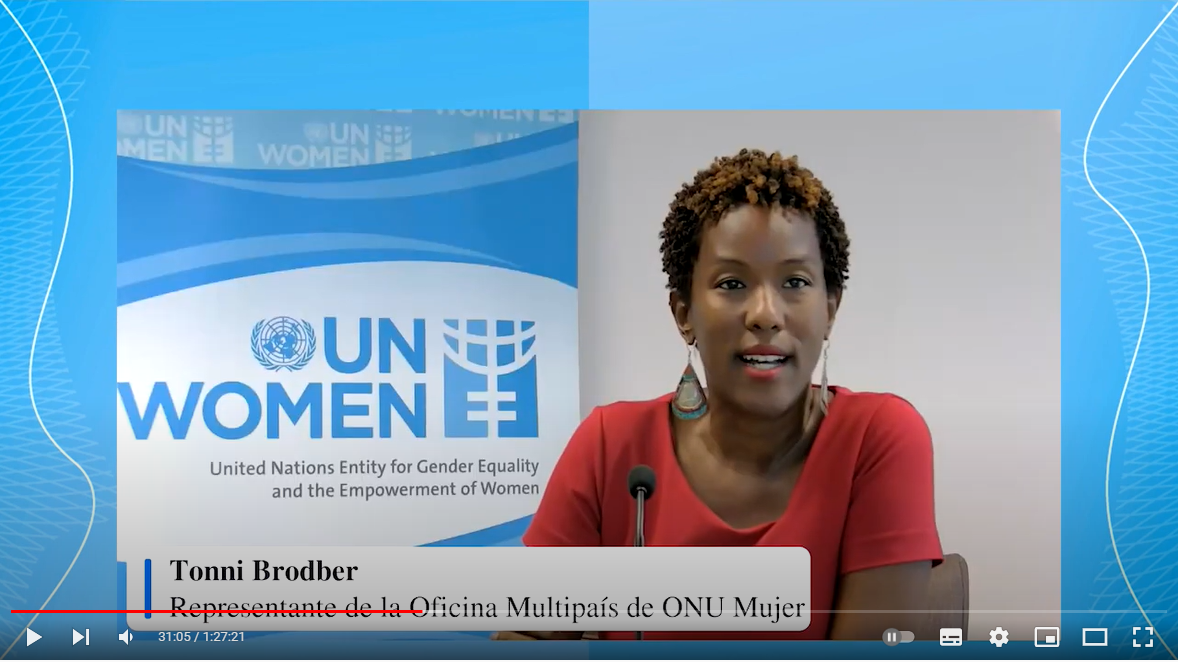“𝗪𝗼𝗺𝗲𝗻 𝗮𝗻𝗱 𝗴𝗶𝗿𝗹𝘀 𝗿𝗲𝗹𝘆 𝗵𝗲𝗮𝘃𝗶𝗹𝘆 𝗼𝗻 𝗽𝘂𝗯𝗹𝗶𝗰 𝘁𝗿𝗮𝗻𝘀𝗽𝗼𝗿𝘁 𝗮𝗻𝗱 𝗳𝗮𝗰𝗲 𝗮 𝗰𝗼𝗺𝗽𝗹𝗲𝘅 𝗶𝗻𝘁𝗲𝗿𝗮𝗰𝘁𝗶𝗼𝗻 𝗼𝗳 𝗳𝗶𝗻𝗮𝗻𝗰𝗶𝗮𝗹, 𝗽𝗵𝘆𝘀𝗶𝗰𝗮𝗹, 𝗮𝗻𝗱 𝘀𝗼𝗰𝗶𝗼-𝗲𝗰𝗼𝗻𝗼𝗺𝗶𝗰 𝗯𝗮𝗿𝗿𝗶𝗲𝗿𝘀 𝗶𝗻 𝘁𝗵𝗲𝗶𝗿 𝗺𝗼𝗯𝗶𝗹𝗶𝘁𝘆.” – UN Women COVID-19 and Ensuring Safe Transport with and for Women and Girls Brief.
In moving around, women and girls have to think about how they will protect themselves from sexual harassment and other forms of gender-based violence (GBV). Ensuring safety therefore is a priority when thinking about women’s mobility. UN Women Caribbean Representative, Tonni Brodber joined the Inter-American Development Bank launch of the “𝗧𝗿𝗮𝗻𝘀𝗽𝗼𝗿𝘁 𝗳𝗼𝗿 𝗜𝗻𝗰𝗹𝘂𝘀𝗶𝘃𝗲 𝗗𝗲𝘃𝗲𝗹𝗼𝗽𝗺𝗲𝗻𝘁: 𝗗𝗲𝗳𝗶𝗻𝗶𝗻𝗴 𝗮 𝗣𝗮𝘁𝗵 𝗳𝗼𝗿 𝗟𝗮𝘁𝗶𝗻 𝗔𝗺𝗲𝗿𝗶𝗰𝗮 𝗮𝗻𝗱 𝘁𝗵𝗲 𝗖𝗮𝗿𝗶𝗯𝗯𝗲𝗮𝗻” publication to discuss how if sufficient analysis is not done, public transportation can deepening social disadvantages, including gender inequality.
“One of the key factors for consideration in the Caribbean, is the design (of transportation) and the intent of the design. Public transportation is rooted in the reality of a space and if that reality is one of inequality, then that is what we are going to see,” said the UN Women Representative.
During the panel discussion with members of academia from across Latin America, she also listed several other factors that negatively impacted women’s mobility and use of transportation in the Caribbean, which included unreliability, safety, and resilience.
She noted however that there is the potential to break the cycle of inequality through investments and policies that take into account the needs of women and girls in all their diversity and that UN Women can and is supporting with the analysis to inform gender transformative design.
Watch here to learn more about the insights shared during this regional dialogue: https://www.youtube.com/watch?v=8trEHalQ6Ds

